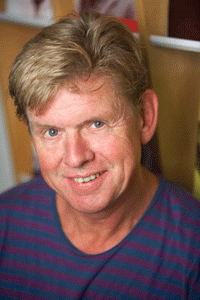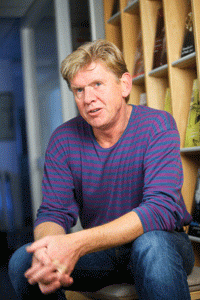
– I believe it is important to incorporate aspects related to masculinity and gender research into other fields of study, says Øystein Gullvåg Holter. This is just one of the ways Holter says the Norwegian research community will be affected by their very first professor in gender equality and masculinity research.
– With my competence as a starting point I want to further the dialogue between gender studies and other fields of study in new areas of research. One such area is the border area between economy and sociology – the enduring structures of a society.
Holter says he wants to trigger curiosity and find new ways of approaching the subject. He emphasises that The Research Council of Norway specifically has requested more basic research and theory on gender equality.
A pioneer
Holter has a long list of publications. This includes papers on the family, care-giving and work life. Up until now he has been a research director at The Nordic Institute for Women’s Studies and Gender Research. His last publication is the report Likestilling og livskvalitet 2007 (Gender equality and quality of life 2007), which is the most extensive survey on men, gender equality and quality of life in the Nordic countries.
– He was one of the first to venture into this field, and he has been a pioneer, says Jorunn Økland, a professor and colleague of Holter at the Centre for Gender Research.
– We feel that this professorship signals a recognition of our field, says Oddrun Rangsæter, office manager at the Centre for Gender Research. The professorship in gender equality and masculinity research is partly financed by the Ministry of Children and Equality.
Not blinded by power
The institute where Holter has been made a professor goes by the gender-neutral name Centre for Gender Research. Until last year it was called Centre for Women’s Studies and Gender Research. Professor Holter sees the new name as a symbol of change.
– It is probably a result of overall changes in the area of gender research. This can be read on different levels. It is a clear signal that both genders are included. On the research level this process was started some time ago, so I am not sure if it will make a big difference.
One thing the gender equality professor is sure of is that the inclusion of masculinity research won’t cause the research to be blinded by power.
– Gender research won’t lose its edge because masculinity research is developed into a field of study.
If one is critical or not is something different than if one focuses on women or on men. These are two separate dimensions, he says. It is obvious that he has had this discussion before.
– Masculinity research helps bring out men’s views on their own terms, and promotes dialogue between men’s self-perception and women’s and other people’s perception of the same. To quote my gender research colleague Jorun Solheim; “as far as gender is concerned, there are two of them”. It is a matter of democratisation.
Progress
But masculinity research is still a small field, also in gender research.

– The current situation is that masculinity research is a marginal field within gender studies. Perhaps ten or twenty per cent of the research focuses on men. It is important that we get more jobs in this field.
At the same time he agrees that masculinity research has experienced progress over the last few years.
– There has been an obvious improvement in Norwegian masculinity research over the last ten years. Masculinity research is also important to the Nordic gender equality project. There has been more emphasis on the fact that gender equality also concerns men, and that men and boys are going through a change. Studies of how care-giving, household chores and decision-making is shared between the genders show that men assume more responsibility at home.
Masculinity research also sheds light on ”the eternal problem” of our gender-segregated labour market. Holter states that 65 per cent of men who work in traditional male professions want a better gender balance at work. 85 per cent of women in female-dominated work places request a better gender balance.
– The fact that so many men want a better gender balance is both surprising and interesting.
An underlying question
– Goethe’s Faust tries to understand what keeps the world together. Do you have an underlying question you want to find the answer to?
– Sure, says Gullvåg Holter and points to his book shelf.
Here is his dissertation, six hundred pages in English with the bold title “Gender, Patriarchy and Capitalism: A Social Forms Analysis” (1997).
– In my thesis I wrote about the mechanisms which cause gender discrimination. It was based on my research on work life and family and on four years of historical-sociological studies of gender, power and family. The question was how to understand and change patterns and mechanisms that create gender discrimination. This is still a pertinent issue.
Some feel that this kind of research is too political. Holter disagrees.
– More knowledge is important regardless of political views. Here in Norway we need to develop more competence precisely because we are at the international forefront of gender equality work. This involves approaching research from different angles and allowing room for diversity and debate. I am looking forward to contributing to a pluralistic and inquiring development in my new job, the professor states.
Translated by: Vigdis Isachsen
Øystein Gullvåg Holter is a sociologist and gender researcher. On april 1st 2008 he was appointed professor in gender equality and masculinity research at the Centre for Gender Research at the University of Oslo. The professorship is partly financed by the Norwegian Department of Children and Equality.